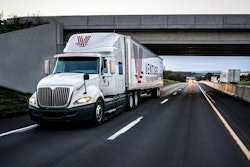Expressing concern over the impact that pending cap-and-trade legislation could have on the nation’s economy and the price of fuel for the trucking industry, an industry official on Thursday, June 19, urged Congress to take a cautious approach to climate change initiatives.
Testifying on behalf of the American Trucking Associations before the Subcommittee on Energy and Air Quality of the House Committee on Energy and Commerce, Randy Mullett — Con-Way Inc. vice president of government relations and public affairs — also said that federal climate change policy must avoid encouraging a patchwork of local, state and regional climate change laws that could hinder the ability of the trucking industry to function in interstate commerce. Citing the nation’s 750,000 motor carriers who deliver goods across state lines, Mullet said the industry supports federal preemption of local, state and regional climate change laws.
“The trucking industry is concerned over what cap-and-trade legislation will do to the price of fuel we consume,” Mullett said. “Our industry can not absorb rapid increases in fuel costs. The trucking industry is extremely sensitive to how climate change legislation may further escalate fuel prices. ATA is urging Congress to carefully evaluate fuel price impacts that result from climate change legislation.”
Currently, governmental entities are enacting localized climate change initiatives, which Mullett said is “unworkable and impracticable” given the interstate and diverse nature of trucking. Mullett added that cap-and-trade programs, the primary mechanism being discussed to promote carbon reductions, are applied more effectively to stationary sources. A widely diverse regulatory patchwork would impede the delivery of the nation’s goods by creating varied economic and administrative regulations that will serve as barriers to an efficient transportation system.
Taking into account the nature of the trucking industry, ATA has identified six key recommendations to reduce fuel consumption and address the impact of these activities on the environment:







